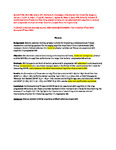Cardiorespiratory fitness and free-living physical activity are not associated with cognition in persons with progressive multiple sclerosis: Baseline analyses from the CogEx study
| dc.contributor.author | Sandroff, BM | |
| dc.contributor.author | Motl, RW | |
| dc.contributor.author | Amato, MP | |
| dc.contributor.author | Brichetto, G | |
| dc.contributor.author | Chataway, J | |
| dc.contributor.author | Chiaravalloti, ND | |
| dc.contributor.author | Cutter, GR | |
| dc.contributor.author | Dalgas, U | |
| dc.contributor.author | DeLuca, J | |
| dc.contributor.author | Farrell, R | |
| dc.contributor.author | Feys, P | |
| dc.contributor.author | Filippi, M | |
| dc.contributor.author | Freeman, J | |
| dc.contributor.author | Inglese, M | |
| dc.contributor.author | Meza, C | |
| dc.contributor.author | Rocca, MA | |
| dc.contributor.author | Salter, A | |
| dc.contributor.author | Feinstein, A | |
| dc.date.accessioned | 2021-10-13T11:38:59Z | |
| dc.date.available | 2021-10-13T11:38:59Z | |
| dc.date.issued | 2021-10-01 | |
| dc.identifier.issn | 1352-4585 | |
| dc.identifier.issn | 1477-0970 | |
| dc.identifier.other | ARTN 13524585211048397 | |
| dc.identifier.uri | http://hdl.handle.net/10026.1/18042 | |
| dc.description.abstract |
<jats:sec><jats:title>Background:</jats:title><jats:p> Aerobic exercise training (physical activity for improving cardiorespiratory fitness) represents a promising approach for managing cognitive impairment in multiple sclerosis (MS). However, there is limited evidence that levels of physical activity and fitness are associated with cognition in progressive MS. </jats:p></jats:sec><jats:sec><jats:title>Objective:</jats:title><jats:p> We examined associations among cardiorespiratory fitness, moderate-to-vigorous physical activity (MVPA), and cognitive performance in a large, international progressive MS sample. </jats:p></jats:sec><jats:sec><jats:title>Methods:</jats:title><jats:p> Two hundred forty European and North American persons with progressive MS underwent cardiorespiratory fitness measurement on a recumbent stepper, wore an ActiGraph GT3X + accelerometer for 7 days for measuring MVPA, and underwent the Brief International Cognitive Assessment in MS. </jats:p></jats:sec><jats:sec><jats:title>Results:</jats:title><jats:p> Cardiorespiratory fitness was not significantly correlated with Symbol Digit Modalities Test (SDMT; r = −0.01; r = −0.04), California Verbal Learning Test-II (CVLT-II; r = 0.05; r = 0.05), or Brief Visuospatial Memory Test–Revised (BVMT-R; r = −0.14; r = −0.14) z-scores controlling for age, sex, and education. MVPA and SDMT ( r = 0.05), CVLT-II ( r = −0.07), and BVMT-R ( r = 0.01) z-scores were not significantly correlated. </jats:p></jats:sec><jats:sec><jats:title>Conclusion:</jats:title><jats:p> Cardiorespiratory fitness and MVPA were not associated with cognition in this large progressive MS sample, yet these outcomes represent critical manipulation checks for documenting the success of the CogEx trial. This highlights the importance of examining other exercise-related mechanisms-of-action for improving cognition in progressive MS. </jats:p></jats:sec> | |
| dc.format.extent | 135245852110483-135245852110483 | |
| dc.format.medium | Print-Electronic | |
| dc.language | en | |
| dc.language.iso | en | |
| dc.publisher | SAGE Publications | |
| dc.subject | Fitness | |
| dc.subject | physical activity | |
| dc.subject | cognition | |
| dc.subject | multiple sclerosis | |
| dc.subject | progressive | |
| dc.title | Cardiorespiratory fitness and free-living physical activity are not associated with cognition in persons with progressive multiple sclerosis: Baseline analyses from the CogEx study | |
| dc.type | journal-article | |
| dc.type | Meeting Abstract | |
| plymouth.author-url | https://www.ncbi.nlm.nih.gov/pubmed/34595972 | |
| plymouth.issue | 7 | |
| plymouth.volume | 28 | |
| plymouth.publication-status | Published | |
| plymouth.journal | Multiple Sclerosis Journal | |
| dc.identifier.doi | 10.1177/13524585211048397 | |
| plymouth.organisational-group | /Plymouth | |
| plymouth.organisational-group | /Plymouth/Faculty of Health | |
| plymouth.organisational-group | /Plymouth/Faculty of Health/School of Health Professions | |
| plymouth.organisational-group | /Plymouth/REF 2021 Researchers by UoA | |
| plymouth.organisational-group | /Plymouth/REF 2021 Researchers by UoA/UoA03 Allied Health Professions, Dentistry, Nursing and Pharmacy | |
| plymouth.organisational-group | /Plymouth/Research Groups | |
| plymouth.organisational-group | /Plymouth/Research Groups/Institute of Health and Community | |
| plymouth.organisational-group | /Plymouth/Research Groups/Plymouth Institute of Health and Care Research (PIHR) | |
| plymouth.organisational-group | /Plymouth/Users by role | |
| plymouth.organisational-group | /Plymouth/Users by role/Academics | |
| plymouth.organisational-group | /Plymouth/Users by role/Researchers in ResearchFish submission | |
| dc.publisher.place | England | |
| dcterms.dateAccepted | 2021-09-01 | |
| dc.rights.embargodate | 2021-10-16 | |
| dc.identifier.eissn | 1477-0970 | |
| dc.rights.embargoperiod | Not known | |
| rioxxterms.versionofrecord | 10.1177/13524585211048397 | |
| rioxxterms.licenseref.uri | http://www.rioxx.net/licenses/all-rights-reserved | |
| rioxxterms.licenseref.startdate | 2021-10-01 | |
| rioxxterms.type | Journal Article/Review |


